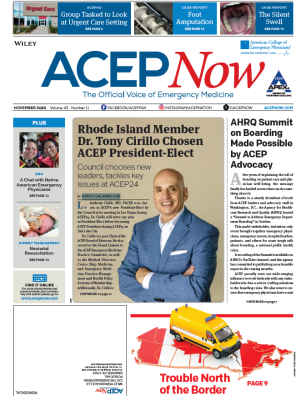Nearly one in five American adults struggles with some form of mental illness, and ED visits for children who attempted suicide or had suicidal thoughts are increasing. The current health care system is failing too many of these patients, making it difficult for them to find appropriate care. Emergency departments are often their only option, although many emergency departments aren’t optimized to provide psychiatric care. Patients with mental health concerns often remain in emergency departments for hours, sometimes days, as follow-up transfers or community care options are secured.
Explore This Issue
ACEP Now: Vol 38 – No 10 – October 2019ACEP has prioritized these issues, advocating for legislative and regulatory changes that would help reduce barriers to treatment and provide more tools and resources for physicians to help meet their patients’ needs. At the same time, we’ve been developing clinical tools and resources to help emergency physicians manage mental health patients in the emergency department. Like many other public health concerns, patient access to mental health care in the emergency department is a complicated problem that requires multipronged solutions.
Advocating for Change
As ACEP advocates for comprehensive mental health care reform, we have seen many ACEP-supported provisions included in House and Senate legislative efforts to enact mental health care reforms in the past few years, including:
- Creating an Assistant Secretary for Mental Health and Substance Use and the National Mental Health and Substance Use Policy Lab
- Extending the Assisted Outpatient Treatment grants and instituting grants for assertive community treatment
- Establishing liability protections for health professional volunteers at community health centers
- Extending suicide prevention programs
- Reauthorizing grants to help train emergency medical personnel to recognize individuals with mental health issues and how to intervene
- Encouraging the Centers for Disease Control and Prevention to improve its National Violent Death Reporting System
- Expanding the mental health workforce
- Clarifying HIPAA privacy rules for patients with mental illness and their caregivers
- Eliminating the Medicaid same-day exclusion
- Seeking additional information about Medicaid managed care plan provision of services for adults at an institution for mental diseases
- Studying participation in the Medicaid Emergency Psychiatric Demonstration project
- Enhancing compliance with mental health and substance use disorder insurance coverage
During the 2019 ACEP Leadership & Advocacy Conference, 500 ACEP members asked their legislators to support H.R. 2519, Improving Mental Health Access from the Emergency Department Act. This important piece of legislation, developed by ACEP, would:
- Expedite transition to post-emergency care through expanded coordination with regional service providers, assessment, peer navigators, bed availability tracking and management, transfer protocol development, networking infrastructure development, and transportation services;
- Increase the supply of inpatient psychiatric beds and alternative care settings such as regional emergency psychiatric units; and
- Expand approaches to providing psychiatric care in the emergency department, including tele-psychiatric support and other remote psychiatric consultations, peak period crisis clinics, or creating dedicated psychiatric emergency service units.

Shutterstock.com
On June 26, the U.S. House Committee on Ways and Means unanimously approved a bill, H.R. 3417, Beneficiary Education Tools, Telehealth, and Extenders Reauthorization (BETTER) Act, to provide patient improvements for rural services provided by Medicare. This bill incorporated a provision based on the ACEP-supported Mental Health Telemedicine Expansion Act that would improve treatment of mental health by providing telehealth services to individuals at home.
Recent Regulatory Efforts
ACEP continues to ask Congress and the Centers for Medicare & Medicaid Services (CMS) to expand Medicare coverage of emergency telehealth services, including tele-psychiatry services.
- April 2018: ACEP members met with CMS to share how innovative psychiatric ED models throughout the country have improved coordination among appropriate providers to improve care for patients experiencing a psychiatric emergency and helped reduce the prevalence of psychiatric boarding.
- June 2018: ACEP members shared the aforementioned psychiatric ED models with key members of Congress.
- December 2018: ACEP responded to a request for comments from the Federal Communications Commission (FCC) related to the National Suicide Hotline Improvement Act of 2018. We supported creating a new three-digit dialing code for mental health emergencies because it could improve access to appropriate care and reduce psychiatric boarding. In August 2019, the FCC issued a formal report to Congress recommending the creation of such a three-digit number.
- April 2019: ACEP responded to a request for information from the bipartisan Congressional Telehealth Caucus. We asked Congress to expand the use of emergency telehealth services, including tele-psychiatry in the emergency department, and we provided several recommendations for upcoming telehealth legislation.
- August 2019: ACEP and the Society for Academic Emergency Medicine responded to the National Institutes of Health’s request seeking input from the community about their use of telehealth in general hospital emergency medical care settings to facilitate the care of individuals with suicide risk.
View these comments in full.
State Advocacy Efforts
As emergency departments deal with issues related to the inability to transfer psychiatric patients out of the emergency department, many states have sought legislative solutions. The State Legislative/Regulatory Committee set out to help chapters with legislative efforts in states that grant emergency physicians authority to involuntarily hold and/or transfer psychiatric patients to an appropriate facility when medically indicated. The committee developed a document that details four legislative approaches to remove barriers and expedite evaluation of psychiatric patients in the emergency department. This resource focuses on involuntary holds, detailing criteria and time limits, along with emergency physician authority and liability.
That document and a variety of other resources including current state bills related to psychiatric holds are available.
Mr. Davis is ACEP director of regulatory affairs. Ms. Grantham is ACEP communications manager.
Pages: 1 2 3 4 | Multi-Page





No Responses to “ACEP4U: Improving Patient Access to Mental Health Care”